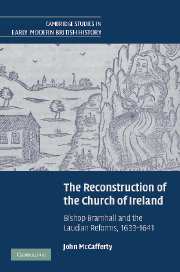Book contents
- Frontmatter
- Contents
- List of tables
- Acknowledgements
- Note on the text
- List of abbreviations
- Map: Church of Ireland dioceses, c.1636
- 1 Prologue: Ireland's English reformation
- 2 Raising up the Church of Ireland: John Bramhall and the beginnings of reconstruction, 1633–1635
- 3 English codes and confession for Ireland, 1633–1636
- 4 The bishops in the ascendant, 1635–1640
- 5 Enforcing the new order, 1635–1640
- 6 The downfall of reconstruction, 1640–1641
- 7 Conclusion: reconstruction as reformation
- Bibliography
- Index
- Titles in the series
6 - The downfall of reconstruction, 1640–1641
Published online by Cambridge University Press: 02 September 2009
- Frontmatter
- Contents
- List of tables
- Acknowledgements
- Note on the text
- List of abbreviations
- Map: Church of Ireland dioceses, c.1636
- 1 Prologue: Ireland's English reformation
- 2 Raising up the Church of Ireland: John Bramhall and the beginnings of reconstruction, 1633–1635
- 3 English codes and confession for Ireland, 1633–1636
- 4 The bishops in the ascendant, 1635–1640
- 5 Enforcing the new order, 1635–1640
- 6 The downfall of reconstruction, 1640–1641
- 7 Conclusion: reconstruction as reformation
- Bibliography
- Index
- Titles in the series
Summary
LEGISLATION AND COMPLAINT: MARCH–JUNE 1640
The Irish parliament of 1640–1 has attracted considerable attention both for the abrupt and dramatic downfall of Strafford's administration and as a prelude to the violence of 1641. More recently, it has regained its place in a wider three kingdoms narrative. In this large literature it is easy to lose sight of the Church of Ireland and of Bramhall himself because they are so enmeshed with other events. Bramhall's own impeachment was, in many ways, ancillary to the demise of the lord lieutenant. There was no Irish trumpet blast equivalent to Root and Branch. The Irish High Commission fell victim not to rioters but rather to the Irish House of Commons. In Strafford's trial the Church of Ireland made only a few appearances and in Laud's trial it figured only to further corroborate charges of ritualism and lust for clerical wealth. If episcopacy were abolished in England, it would be abolished in Ireland as well. Irish bishops were merely a secondary branch to be lopped off.
The gradual breakdown of authority in Ireland during 1640 and 1641 raised some large constitutional questions and ushered in two decades of violence. Yet even before 23 October 1641 the reconstruction work of the 1630s had already been comprehensively dismantled. Book of canons apart, almost every aspect of Bramhall's work was obliterated or undermined to the point of collapse over five sessions from 16 March 1640 to 17 November 1641.
- Type
- Chapter
- Information
- The Reconstruction of the Church of IrelandBishop Bramhall and the Laudian Reforms, 1633–1641, pp. 193 - 222Publisher: Cambridge University PressPrint publication year: 2007



